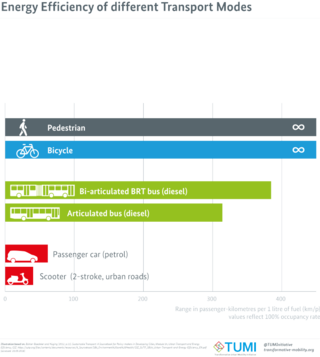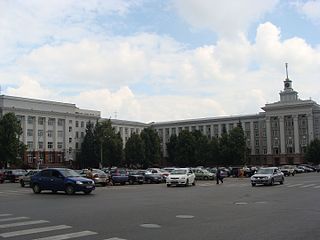
Smart growth is an urban planning and transportation theory that concentrates growth in compact walkable urban centers to avoid sprawl. It also advocates compact, transit-oriented, walkable, bicycle-friendly land use, including neighborhood schools, complete streets, and mixed-use development with a range of housing choices. The term "smart growth" is particularly used in North America. In Europe and particularly the UK, the terms "compact city", "urban densification" or "urban intensification" have often been used to describe similar concepts, which have influenced government planning policies in the UK, the Netherlands and several other European countries.

A modular building is a prefabricated building that consists of repeated sections called modules. Modularity involves constructing sections away from the building site, then delivering them to the intended site. Installation of the prefabricated sections is completed on site. Prefabricated sections are sometimes placed using a crane. The modules can be placed side-by-side, end-to-end, or stacked, allowing for a variety of configurations and styles. After placement, the modules are joined together using inter-module connections, also known as inter-connections. The inter-connections tie the individual modules together to form the overall building structure.

The Housing & Development Board, is a statutory board under the Ministry of National Development responsible for the public housing in Singapore. Established in 1960 as a result of efforts in the late 1950s to set up an authority to take over the Singapore Improvement Trust's (SIT) public housing responsibilities, the HDB focused on the construction of emergency housing and the resettlement of kampong residents into public housing in the first few years of its existence.
Urban planning in Singapore is the direction of infrastructure development in Singapore. It is done through a three-tiered planning framework, consisting of a long-term plan to plot out Singapore's development over at least 50 years, a Master Plan for the medium term, and short-term plans, the first two of which are prepared by the Urban Redevelopment Authority (URA) and the last by multiple agencies.

Affordable housing is housing which is deemed affordable to those with a household income at or below the median as rated by the national government or a local government by a recognized housing affordability index. Most of the literature on affordable housing refers to mortgages and a number of forms that exist along a continuum – from emergency homeless shelters, to transitional housing, to non-market rental, to formal and informal rental, indigenous housing, and ending with affordable home ownership.
The term "sustainable communities" has various definitions, but in essence refers to communities planned, built, or modified to promote sustainable living. Sustainable communities tend to focus on environmental and economic sustainability, urban infrastructure, social equity, and municipal government. The term is sometimes used synonymously with "green cities," "eco-communities," "livable cities" and "sustainable cities."

Home construction or residential construction is the process of constructing a house, apartment building, or similar residential building generally referred to as a 'home' when giving consideration to the people who might now or someday reside there. Beginning with simple pre-historic shelters, home construction techniques have evolved to produce the vast multitude of living accommodations available today. Different levels of wealth and power have warranted various sizes, luxuries, and even defenses in a "home". Environmental considerations and cultural influences have created an immensely diverse collection of architectural styles, creating a wide array of possible structures for homes.
Community economic development (CED) is a field of study that actively elicits community involvement when working with government and private sectors to build strong communities, industries, and markets. It includes collaborative and participatory involvement of community dwellers in every area of development that affects their standard of living.
The Design Quality Indicator (DQI) is a toolkit to measure, evaluate and improve the design quality of buildings.

Public housing in Australia is one part of social housing and the other is community housing. Public housing is provided by departments of state governments. Australian public housing operates within the framework of the Commonwealth-State Housing Agreement, by which funding for public and community housing is provided by both federal and state governments. According to the 2006 census, Australia's public housing stock consisted of some 304,000 dwellings out of a total housing stock of more than 7.1 million dwellings, or 4.2% of all housing stock.

The New Jersey Department of Community Affairs is a governmental agency of the U.S. state of New Jersey.

The Ministry of National Development is a ministry of the Government of Singapore responsible for the formulation and implementation of policies related to the land-use planning and infrastructure development in Singapore.
Eco-towns are a government-sponsored programme of new towns to be built in England, which are intended to achieve exemplary standards of sustainability.

A laneway house is a form of detached secondary suites in Canada built into pre-existing lots, usually in the backyard and opening onto the back lane. Most laneway houses are small. However, public concern has been raised in some communities about the impact that larger forms of this type of housing may have on privacy. Laneway houses are found in densely populated areas in Canadian cities, including Edmonton, Toronto, and Vancouver.

Sustainable urbanism is both the study of cities and the practices to build them (urbanism), that focuses on promoting their long term viability by reducing consumption, waste and harmful impacts on people and place while enhancing the overall well-being of both people and place. Well-being includes the physical, ecological, economic, social, health and equity factors, among others, that comprise cities and their populations. In the context of contemporary urbanism, the term cities refers to several scales of human settlements from towns to cities, metropolises and mega-city regions that includes their peripheries / suburbs / exurbs. Sustainability is a key component to professional practice in urban planning and urban design along with its related disciplines landscape architecture, architecture, and civil and environmental engineering. Green urbanism and ecological urbanism are other common terms that are similar to sustainable urbanism, however they can be construed as focusing more on the natural environment and ecosystems and less on economic and social aspects. Also related to sustainable urbanism are the practices of land development called Sustainable development, which is the process of physically constructing sustainable buildings, as well as the practices of urban planning called smart growth or growth management, which denote the processes of planning, designing, and building urban settlements that are more sustainable than if they were not planned according to sustainability criteria and principles.
Green affordable housing is reasonably priced housing that incorporates sustainable features. The phenomenon has become increasingly common in the United States with the adoption of state and local policies that favor or require green building practices for publicly owned or funded buildings. Potential benefits of green affordable housing include lower energy cost burden and improved health. One challenge to green affordable housing is the tendency to overlook long-term benefits in the face of higher upfront cost. The challenge for green housing advocates is to see to the life cycle cost of the building. Many affordable housing projects already find it a challenge to raise capital to finance basic affordable housing. Green affordable housing has taken form in traditionally wooden homes and most recently with 'upcycling' shipping containers
Emerald Cities Collaborative (ECC) is a national non-profit organization based in Washington, D.C., with affiliate offices in Boston, Los Angeles, New York, Oakland, San Francisco and Seattle. Founded in 2009, Emerald Cities has the stated goal of creating "high-road" local economies that are sustainable, just and inclusive.

The Government of Bashkortostan is a governing body of Bashkortostan in Russia which exercises executive power under the authority of the Republic Head whom appoints cabinet which is composed of the Prime Minister, the deputy prime ministers, and the ministers that are approved by the governing legislature is the State Assembly.

The State Committee for Transport and Roads is a Cabinet department in the Executive branch of the Republic of Bashkortostan government. It is the successor of the former Ministry of Construction, architecture and transport, which was split in State Committee for construction and architecture and State Committee for Transport and Roads in 2010 under President Rustem Khamitov.

The Department of Communities, Housing and Digital Economy (CHDE), formerly Housing and Public Works, is a ministerial department within the Queensland Government, tasked with providing housing, sport, digital technology, and urban design and architecture services Both Smart Service Queensland (SSQ) and Queensland Shared Services (QSS) sit within CHDE, providing whole-of-government services including HR, payroll, procurement, infrastructure, and state-wide contact centre solutions.















